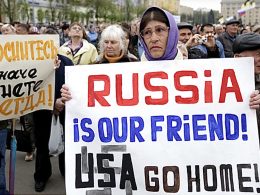The divide that’s emerged between the pro-Russian and anti-Russian sides of the USA’s communist movement is about more than whether we should support Russia’s military operation, or about whether we should support Russian-sympathetic coalitions such as Rage Against the War Machine. These points of contention relate to a longer-term strategic question: whether or not communists should let the fear of retaliation from the state define their practice. Because the orgs that support Russia’s Ukraine action, and join with elements outside the “left” niche, are the orgs which the state has the best reasons to target; the Uhuru raids and indictments have shown this.
That risk which pro-Russian orgs like Uhuru have taken on is the basis for a big part of the argument which the compromised communist groups make for their own position. Their rationale for compromising is that doing all we can to fight U.S. hegemony will make the state more likely to target us, and therefore it’s supposedly best to not be too transgressive on anti-imperialism. This argument disregards a crucial part of the history of capitalist state crackdowns: that no matter how much socialists try to look “respectable” in the view of bourgeois law, the law will come for them. Which means it’s essentially inevitable that the USA’s communist (and broader anti-imperialist) movement will be forced to go underground; so the right way to try to survive is not by compromising with our ruling institutions.
We should obviously avoid adventurism, and maintain a “mass line” where we publicly present statements which won’t alienate the people; that doesn’t mean denouncing the actions of anti-imperialist countries, though. And it certainly doesn’t mean isolating ourselves from essentially all the anti-NATO groups because the liberals and ultra-lefts have labeled these groups as untouchable. Nurturing the anti-imperialist impulses of the workers is the basis on which we can build a relationship with a majority of the people, and mobilize enough of them to be able to create a genuine threat towards the state.
We can’t do that by appeasing the anti-Russian sensibilities of the liberal minority, or by letting the “left” social media circles police who we ally with. Rejecting such practices is essential for our movement being able to continue amid the state’s next attacks. Attacks which will be progressively more intense, and can only be countered if we have abundant allies; allies both within the anti-NATO movement, and among the people themselves. The liberal NGOs, and the radical liberals who largely aren’t willing to become authentic allies to the class struggle, can’t provide us with such protection.
The history of Ukraine since its 2014 U.S. coup has demonstrated these realities about how opponents of fascism can win when the fascists will only keep escalating their war against dissent. After organizers against the coup were massacred in 2014, fascist vigilante beatings of communists became normalized, and Ukraine’s communist party was banned in 2015, people still organized; but they had to do so carefully, for fear of being hunted down either by the state-enabled Nazi militias or by the state itself. A “left” still exists within public life in Ukraine, but when the country is now at a point where the president has outlawed all substantially threatening opposition parties, those within this “left” can only be the worst kinds of left opportunists: anarchists who deliberately go to fight on the side of a fascist state; “leftists” who give interviews decrying Russia’s anti-fascist intervention because Russia is capitalist; “leftists” whose dogmatism can be turned into an asset for monopoly finance capital.
The only kinds of socialists within today’s Ukraine who represent a serious threat towards fascism are the ones who’ve in essence separated themselves from the left; as the “left” has come to mean grifters who promote pro-fascist and pro-imperialist propaganda from a “progressive” angle. The dogmatic opportunists who are allowed to have a public presence in modern Ukraine—without being persecuted or put in danger of state-encouraged assassination, like Ukrainian communists now are—will never do what’s practically necessary to defeat Banderism. That being to build an underground network which can overthrow the state either so workers democracy can be established, or Russia can take temporary control over the territories the Banderites still hold. As communists we of course prefer the former outcome, but the most urgent need is for the Ukrainian state to be overthrown.
Such is the conclusion that all opponents of the U.S. empire are ultimately going to need to come to about the state we live under. The USA’s liberal fascist state is in the process of doing the equivalent of what Ukraine’s Banderite state has done. And this means that each element of this country’s anti-NATO movement is at risk of being suppressed, just like all of those Ukrainian parties which got banned following the criminalization of the communist party. “First they came for the communists” is the most classic warning about being complacent amid fascism, and all who oppose our government’s wars (or who oppose capitalism in a more serious way than the pro-NATO “leftists”) are ultimately going to be put after Uhuru in liberal fascism’s list of targets.
That shows the tragic foolishness of the types of American Marxists who’ve rejected solidarity with the rest of the anti-NATO movement, and who’ve for the same reason compromised on their own anti-imperialist stances. As soon as our class conflict escalates enough, they’ll become targets like Uhuru has; the difference is that whereas Uhuru has the strongly anti-imperialist allies to give its members platforms, legal aid, and narrative help during its battle with the state, the sectarian Marxists will only have unreliable liberal “allies” when they come under attack.
We can’t save the elements of the American left that don’t want to be saved; we can’t force them to give up their liberal tailism, and become serious agents within history. What we can do is commit to the next parts of this fraught, costly, yet absolutely necessary journey we’ve decided to start upon. By taking the pro-Russian stance, and building the anti-monopoly alliance required to bring anti-imperialism to a majority of the people, we’ve accepted the attacks which this will cause the system to direct towards us.
Being in the core of imperialism, where the dictatorship of capital has far stronger control than in the peripheral countries, we can’t expect to overcome these attacks by electorally outmaneuvering the reactionaries, like Hugo Chavez did in Venezuela. The state here will never give us the leverage to be able to reform it. Most likely is a scenario where the state, in order to maintain its image as a great example of liberal “democracy,” tries to wage an increasingly deadly war against dissent while keeping plausible deniability. The elites of monopoly finance capital hope that a decade from now, when inequality has become far more extreme than it already is, they’ll be able to wage a war against the USA’s own people while keeping up liberalism’s narrative of nobility.
That would require excluding a great majority of the people (that being the socioeconomically disadvantaged) from politics; making sure this majority can’t gain any leverage over the established mode of government, while censorship and psychological operations conceal the atrocious nature of this domestically directed war. That’s a project which would require keeping the people too isolated from one another, and too detached from mass movements, to be able to gain a collective voice or engage in subversive activities. It’s the anti-imperialist movement’s job to provide the people with the tools they need to attain this historical agency.
————————————————————————
If you appreciate my work, I hope you become a one-time or regular donor to my Patreon account. Like most of us, I’m feeling the economic pressures amid late-stage capitalism, and I need money to keep fighting for a new system that works for all of us. Go to my Patreon here.
To keep this platform effective amid the censorship against dissenting voices, join my Telegram channel.








